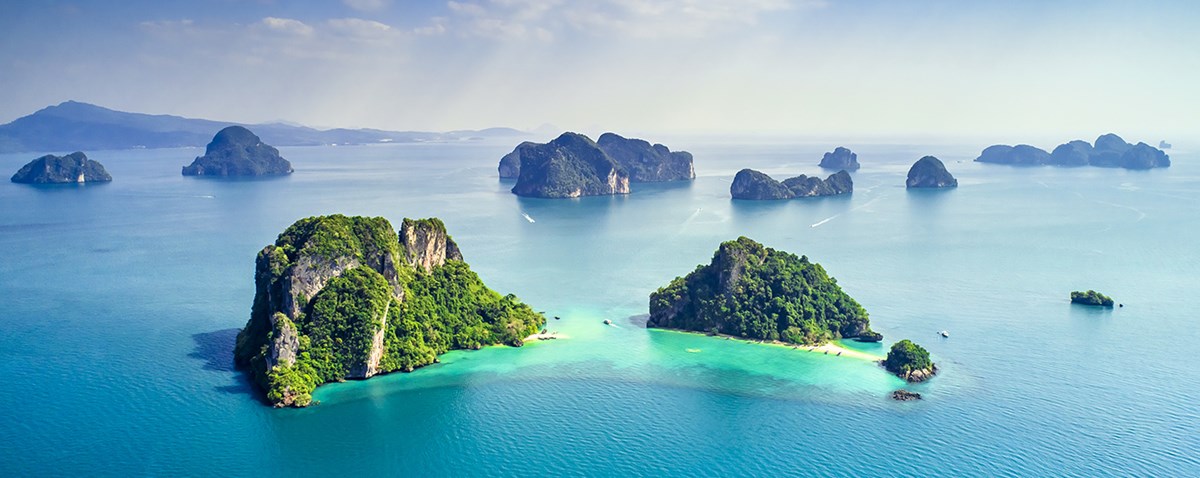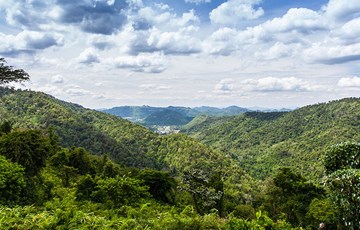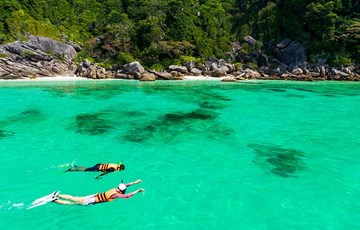
8 easy ways to become a more eco-friendly traveller in Thailand
Since the coronavirus lockdown, Thailand’s cities, wild havens and islands have had a chance to recover, so it is vital to preserve this bounce back by practising responsible tourism. These are just some of the small, simple changes you can make to become a more sustainable traveller and support local communities when they need it the most…
1. Pack eco-friendly essentials

Use reef-safe suncream to protect coral reef and marine life (Shutterstock)
Start your trip by packing lightly with biodegradable, cruelty-free toiletries, a refillable water bottle, a fabric or net bag for shopping, hand sanitiser or a bar of soap and organic hydration mist. Make sure you buy a non-toxic insect repellent or pack essential oils of eucalyptus, lemon balm or citronella, which are all effective at repelling mosquitoes without harming the environment.
Reef-friendly sun cream is vital, as many brands contain harmful chemicals that react in warm seawater to form hydrogen peroxide which is harmful to reefs and all sea life. Reusable bamboo utensil sets and food containers are fantastic for day trips and excursions and means you avoid wasteful plastic takeout containers. Even small things like reusable cotton pads to remove make-up, cloth laundry bags and quick-dry towels will also cut your footprint. Don’t forget a first-aid travel kit, mini torch and solar-powered power pack for your phone and camera.
2. Swap taxis and planes for public transport and trains

Train on River Kwai Bridge of Kanchanaburi
Whenever possible, you should explore a new destination by foot or bike — these are the greenest transport options and allow you to get deep into the heart of a place where cars can’t always reach. Traveling on buses and trains saves petrol and gives you the chance to interact with local people. If you’re going on a longer journey, minibuses or even car shares are a small way to reduce your carbon footprint.
When travelling around the country, overland is the greenest option, as planes produce a crazy amount of carbon that is killing the atmosphere. Bangkok has a well-connected Skytrain, known as a BTS train, and there’s also long-distance bus routes and spectacular boat trips down the Mekong River.
It may take longer, but it is far greener and the spectacular views you get to enjoy from the window will make it worth it.
3. Opt for an eco-lodge

Stay in one of Thailand's many eco-lodges (Shutterstock)
If you want to stay somewhere that strives to preserve the environment, helps wildlife and supports local communities, then look no further than an eco-lodge. Perched on the edge of an ocean-fringed jungle on the unspoilt Koh Kood Island, Soneva Kiri prides itself on offering a sustainable and adventurous experience. As well as harvesting rainwater and capturing sunlight to fuel the solar-powered lighting, this luxe, low-impact resort was one of last year’s winners of the Responsible Thailand Awards and it’s easy to see why. The lodge has banned bottled water, recycles cooking oil into biofuel and uses fresh, local produce in its kitchen. In keeping with its green mission, the lodge raised $5.5 million through a carbon-levy to help thousands of people in need and its coral-restoration projects help marine life flourish. Activities on offer include wildlife watching, scuba-diving excursions and an observatory to look at stars.
Hidden away in the rainforests of Krabi Island, Anana Ecological retreat is another masterpiece of sustainability, with its own water source and permaculture farm growing organic produce for its vegetarian restaurant and vegan cafe. The retreat has a treehouse yoga salon, a sky garden that restores 50% of that footprint, electric tuk-tuks and solar-powered boats that glide silently through the sea.
Bangkok Treehouse Hotel is a sanctuary in the city amid a canopy of mangroves and palms, where you can sleep in treehouse nests or on floating mattresses on the water. The solar-and-wind-powered 12-room inn on Bang Krachao, a small isle known as Bangkok’s green lung in the Chao Phraya River, offers local organic cuisine and many other eco-friendly touches, along with supporting river clean-ups.
4. Go wild and camp

The Floating Rainforest Camp in Elephant Hills (Tourism Authority of Thailand)
If you’re a nature lover and want to see wild animals thriving in their original habitats, then it’s important to give something back. With more than 110 national parks in Thailand, visitors can see the local wildlife and enjoy the rugged nature. Khao Yai National Park, for example, is just two hours away from Bangkok and offers camping opportunities by the river and lake, where the nights are ablaze with fireflies and mornings buzz with bird song and sounds of the wild. Visitors can see waterfalls, wild elephants, deer and boar. The more popular parks provide log-cabin-style bungalow accommodations, plus tents and supplies for campers.
Another camping destination not far from the capital is the riverside Nam Pha Pa Yai.The park is famous for its great rock climbing and has tents, tree houses, cabins and other naturalistic lodging options. Over in Khao Sok National Park, Elephant Hills offers luxury camping, where you can immerse yourself in the surrounding flora and fauna and enjoy sightings of the elephants that roam this wild park.
5. Choose your tour operator carefully

Choose your tour operator carefully to ensure they are sustainable (Shutterstock)
An easy way to be a more sustainable travel is by choosing tour operators with great eco-credentials. Look for companies that run conservation and community initiatives and be sure to choose a group that doesn’t disturb wildlife; wildlife encounters should be from a distance, without ruining the surrounding environment. Black Tomato is just one good example of a sustainable tour operator as they support local communities and wildlife and use local guides from Bangkok and beyond to show the lesser-known parts of Thailand.
One of last year's Responsible Thailand Award winners, Planterra (established by G Adventures) also offer ethical adventures through the country, supporting community based tourism in areas which had previously been bypassed by travellers. Not only does this mean you will get to go off-the-beaten track and discover an authentic side of Thailand, you will also be giving back to the communities you visit.
6. Say no to single-use plastic

Avoid single-use plastic by bringing your own reusable water bottle (Shutterstock)
Sadly, plastic often ends up in nature, devasting the environment and entangling and killing wildlife on both land and in the water. Forego single-use plastic and use reusable bottles to help combat pollution and waste. There are many refill stations and filtered-water machines in public places throughout Thailand that help to make this change an easy one. Travellers can also buy and refill reusable bottles from water coolers at many hotels and guesthouses. Koh Lipe has a fantastic water-refill scheme. Get yourself a ‘Love Lipe’ flask and fill it up for free at refill stations around the island.
Other easy ways to avoid plastic is to skip plastic straws, cups and coffee stirrers when ordering drinks and use bamboo travel cutlery sets instead of plastic forks that may be on offer. Take your own fabric bags shopping and avoid single-use takeaway boxes by offering your own reusable food containers.
7. Dine in eco-friendly restaurants

Dine in eco-friendly restaurants (Shutterstock)
Agriculture is considered the world’s leading cause for wildlife extinction and pollution, so choosing vegetarian or vegan meals is the best thing you can do for animals and the earth. A new Bangkok chain, Veganerie offers a minimalist atmosphere with lots of plants and pop-up events, while the folksy vintage-inspired Bonita Cafe & Social Club, run by a couple and their two rescued cats dishes up comfort grub of pasta, pancakes and milkshakes. Broccoli Revolution, the city’s hippest brassiere and cold-pressed-juice bar, serves colourful East-West-fusion cuisine with a focus on zero-waste and giving to non-profits. All the meat-free dishes are seasonal, locally-grown and the homemade cakes are supplied by small bakeries.
If you’re after an authentic Thai taste, try Na Aroon. Nestled in an old villa-turned-boutique-hotel and surrounded by a leafy-green oasis, this swanky eatery offers a dizzying array of seasonal Thai veggie classics and some responsibly-sourced seafood.
Chiang Mai, meanwhile, is leading the country’s surging green-scene with literally hundreds of vegan, vegetarian and farm-to-table restaurants. The pioneering Alum serves plant-based Thai street food and supports local organic farmers. Hidden in the Wat Suan Dok Temple, Pun Pun features authentic Thai and Burmese dishes, with views of the temple gardens.
8. Limit your energy and water use

Limit your water use in Thailand (Shutterstock)
Water is a precious scarcity in many countries and the staggering amount of both energy and water used by tourists has a huge impact on the locals and the environment. The answer to this one is simple enough: shower instead of bathe, make those showers short and turn off the tap when you brush your teeth.
When staying at hotels or guesthouses, help them keep their carbon footprint down by only asking for new towels and linens when necessary. You can also book your travel with hotels and resorts that are part of the Rainforest Alliance. These hotels work tirelessly to conserve water usages throughout their properties and encourage guests to do the same.


